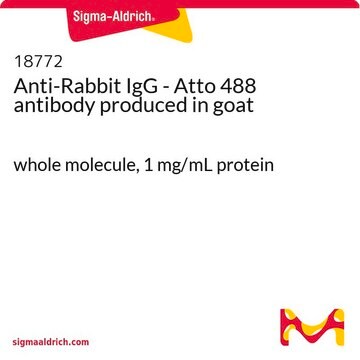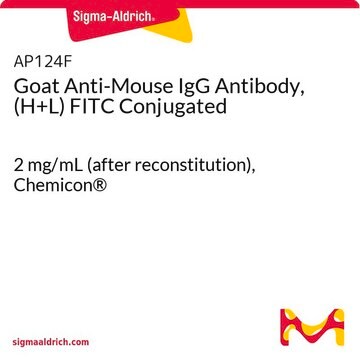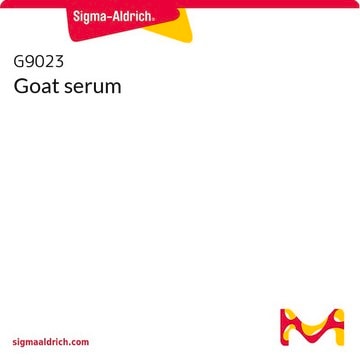62197
Anti-Mouse IgG (whole molecule)−Atto 488 antibody produced in goat
~1 mg/mL
Synonym(s):
Atto 488 Anti-Mouse IgG, Goat Anti-Mouse IgG
About This Item
Recommended Products
biological source
goat
conjugate
Atto 488 conjugate
antibody form
affinity isolated antibody
antibody product type
secondary antibodies
clone
polyclonal
form
liquid
contains
50% glycerol as stabilizer
species reactivity
mouse
concentration
~1 mg/mL
technique(s)
immunocytochemistry: 1:500
immunofluorescence: 1:400
fluorescence
λex 500 nm; λem 522 nm in PBS
shipped in
wet ice
storage temp.
−20°C
target post-translational modification
unmodified
Related Categories
General description
Immunogen
Application
- in immunofluorescence confocal microscopic assay for p65 localization
- in immunohistochemical analysis
Immunofluorescence (1 paper)
Biochem/physiol Actions
Physical form
Analysis Note
Legal Information
Disclaimer
Not finding the right product?
Try our Product Selector Tool.
Storage Class Code
10 - Combustible liquids
WGK
WGK 2
Flash Point(F)
Not applicable
Flash Point(C)
Not applicable
Personal Protective Equipment
Certificates of Analysis (COA)
Search for Certificates of Analysis (COA) by entering the products Lot/Batch Number. Lot and Batch Numbers can be found on a product’s label following the words ‘Lot’ or ‘Batch’.
Already Own This Product?
Find documentation for the products that you have recently purchased in the Document Library.
Customers Also Viewed
Articles
Immunoblotting (Western blot transfer) is a common technique in modern proteomics research.
Protocols
TrueGel3D® Hydrogel Plate protocol guides high-throughput culture of human adipose MSCs for screening applications.
TrueGel3D® Hydrogel Plate protocol guides high-throughput culture of human adipose MSCs for screening applications.
TrueGel3D® Hydrogel Plate protocol guides high-throughput culture of human adipose MSCs for screening applications.
TrueGel3D® Hydrogel Plate protocol guides high-throughput culture of human adipose MSCs for screening applications.
Our team of scientists has experience in all areas of research including Life Science, Material Science, Chemical Synthesis, Chromatography, Analytical and many others.
Contact Technical Service








